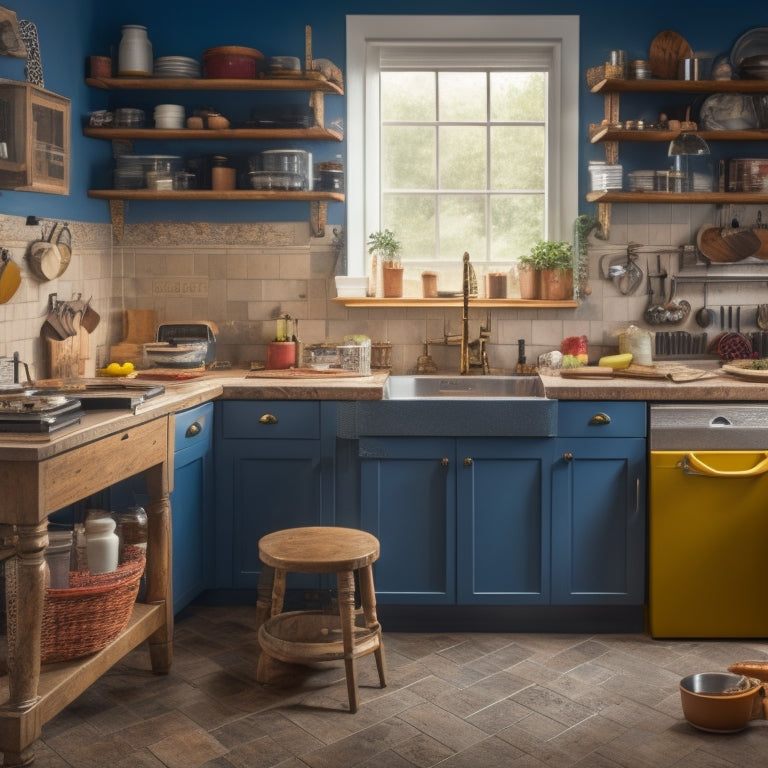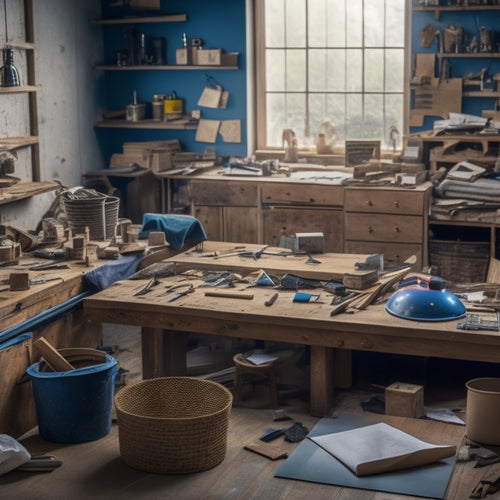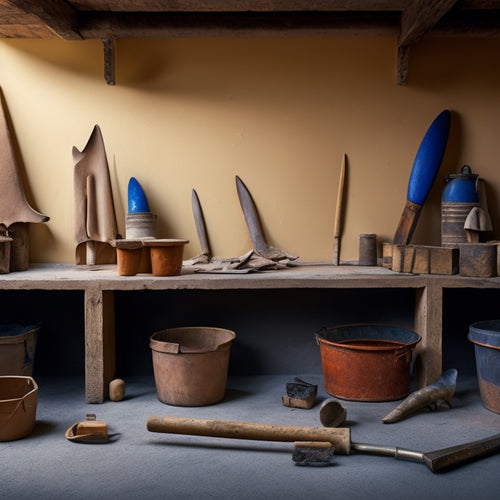
Why You Need Specialized Tools for Kitchen Renovation
Share
When tackling a kitchen renovation, you'll quickly discover that specialized tools are essential for achieving a professional-quality finish. Concrete finishing, in particular, requires precision and control to overcome challenges like porous surfaces, cracks, and unevenness. Without the right tools, you'll struggle to achieve a flawless finish, and your renovation will likely suffer from imperfections. By investing in specialized tools like tamping tools, edging tools, and finishing tools, you'll gain the precision and control needed to execute your design vision with confidence. As you explore the complexities of concrete finishing, you'll uncover more reasons why the right tools are vital to achieving a stunning, functional kitchen.
Key Takeaways
• Specialized tools provide precise control and consistent results, ensuring a flawless finish and preventing imperfections in kitchen renovations.
• Quality of finish heavily relies on the use of tools designed for concrete work, making tool selection critical for achieving desired results.
• Mastering techniques with quality tools enables confident and precise execution of design vision, leading to professional-quality results.
• Using specialized tools facilitates efficient work, leading to cost savings, reduced mistakes, and improved craftsmanship in kitchen renovations.
• Investing in specialized tools allows for precise pressure application and control during finishing, resulting in high-quality finishes comparable to professional results.
DIY Concrete Finishing Tools Needed
When tackling a DIY concrete finishing project, you'll need to equip yourself with a range of specialized tools to achieve a professional-looking result. Concrete texture techniques require precision and control, and the right equipment is essential to achieving the desired finish.
Among the essential finishing equipment you'll need are tamping tools, such as bull floats and hand trowels, which help to remove air pockets and smooth out the surface. You'll also require edging tools, like edgers and jointers, to create clean, defined edges and joints.
Additionally, you'll need to invest in finishing tools, such as power trowels and concrete floats, to achieve a smooth, even finish. These tools will allow you to apply the necessary pressure and control to achieve the desired concrete texture techniques.
With the right equipment, you'll be able to achieve a high-quality finish that rivals professional results. By investing in these specialized tools, you'll be able to take control of your DIY concrete finishing project and achieve the aesthetic you desire.
Challenges of Concrete Wall Finishing
Finishing a concrete wall requires maneuvering a unique set of challenges that can make all the difference between a professional-looking result and a subpar finish.
As you commence this project, you'll encounter surfaces that are porous, uneven, and prone to cracks. To overcome these obstacles, you'll need to employ precise surface preparation techniques, such as grinding, acid etching, or shot blasting, to create a smooth canvas for your desired finish.
Next, you'll need to select the ideal texture application methods to achieve the desired aesthetic. This might involve applying a knockdown texture, an orange peel texture, or even a smooth finish.
Each method requires a deep understanding of the materials and techniques involved, as well as the patience and skill to execute them flawlessly. You'll also need to reflect on factors like moisture levels, temperature, and humidity, which can greatly impact the final result.
Importance of Specialized Finishing Tools
You'll soon discover that the quality of your concrete wall finish hinges on the specialized tools you use to apply and refine textures. The wrong equipment can lead to unevenness, imperfections, and even damage to the wall itself.
To achieve a flawless finish, you'll need to invest in tools specifically designed for the task. This is where tool selection becomes essential. Specialized finishing tools, such as trowels, floats, and edgers, are engineered to deliver precise control and consistent results.
By mastering specialized techniques with these tools, you'll be able to achieve the desired texture, pattern, and sheen. For instance, a high-quality trowel will allow you to apply the perfect amount of pressure, ensuring an even distribution of material.
Similarly, a precision edger will help you create clean, sharp lines and crisp corners. With the right tools, you'll be able to execute your design vision with confidence and precision, resulting in a stunning concrete wall finish that exceeds your expectations.
Benefits of Professional-Quality Results
How do professional-quality results elevate your kitchen renovation, transforming it from a mere functional space to a stunning showpiece that reflects your personal style and sophistication?
With specialized tools, you can achieve a level of craftsmanship that enhances your kitchen's aesthetics, making it a true focal point of your home. Professional-quality results don't just look amazing; they also increase the value of your property and provide a sense of pride and satisfaction.
When you use specialized tools, you're able to work more efficiently, completing tasks quickly and accurately. This renovation efficiency translates to cost savings and a reduced risk of costly mistakes.
Furthermore, professional-quality results guarantee that your kitchen renovation meets the highest standards of quality, durability, and functionality. You'll enjoy a kitchen that's not only beautiful but also functional, safe, and easy to maintain.
Avoiding Costly Renovation Mistakes
By leveraging specialized tools, you can sidestep common pitfalls that lead to costly renovation mistakes, ensuring a seamless kitchen transformation that meets your vision and budget.
One of the most vital aspects of a successful renovation is budget planning. Without a clear understanding of your financial constraints, you risk overspending on materials, labor, and unexpected expenses. Specialized tools help you create a realistic budget and stick to it, avoiding costly surprises along the way.
Additionally, material selection is a significant decision that can make or break your renovation. With the right tools, you can:
-
Accurately measure and calculate material quantities, reducing waste and saving you money.
-
Select materials that meet your functional and aesthetic needs, ensuring a cohesive and beautiful design.
-
Identify potential design flaws and make adjustments, preventing costly rework and ensuring a smooth installation process.
Frequently Asked Questions
Can I Use Regular Cleaning Products on Concrete Surfaces?
When you're working with concrete surfaces, you're wise to think twice about using regular cleaning products. These products can damage the surface or leave behind residues that affect future coatings or finishes.
Instead, you'll want to employ specialized cleaning techniques that guarantee proper surface preparation. Look for products specifically designed for concrete, and always follow the manufacturer's instructions to achieve a clean, stable surface that's ready for your kitchen renovation.
How Do I Protect My Floors During Renovation?
You'll want to shield your floors from dust, debris, and damage during renovation.
Start by applying floor coverings, such as plastic sheets or drop cloths, to create a barrier. Additionally, place protective mats at high-traffic areas to prevent scratches and scuffs.
Secure these coverings with tape to guarantee they stay in place. By taking these proactive measures, you'll maintain your floors' integrity and aesthetics throughout the renovation process.
What Is the Ideal Temperature for Concrete Finishing?
When you're working with concrete, you'll want to guarantee ideal curing conditions.
The perfect temperature for concrete finishing is between 50°F and 70°F (10°C and 21°C). If it's too hot or cold, it can greatly impact the curing process.
Temperature effects can lead to weak spots, cracks, or even complete failure. You'll need to maintain a consistent temperature to achieve a strong, durable finish.
Can I Finish Concrete Walls During Winter Months?
As you brave the winter chill, you wonder if finishing concrete walls is feasible. You'll face winter challenges, but with the right approach, you can overcome them.
Concrete curing demands ideal temperatures, typically between 50°F and 75°F. During winter, guarantee proper insulation, use heating blankets, and maintain a consistent temperature to facilitate curing.
With careful planning, you can successfully finish concrete walls, even in the dead of winter.
What Safety Gear Is Required for Concrete Finishing?
When you're finishing concrete, you're not just working with a material - you're working with a process.
You'll need to prioritize concrete curing, which demands strict safety precautions.
You'll require a hard hat, safety glasses, and a dust mask to protect yourself from flying debris and silica dust.
Don't forget knee pads, gloves, and steel-toed boots to shield yourself from physical hazards.
Conclusion
As you navigate the complex landscape of kitchen renovation, remember that specialized tools are the master keys that unfasten a polished, professional finish.
Without them, you're left wandering in the dark, trying to force a square peg into a round hole.
Invest in the right tools, and your concrete walls will shine like a perfectly set gem, elevating your kitchen from mere functionality to a stunning work of art.
Related Posts
-

7 Best Home Renovation Project Checklists With Timelines
You're about to initiate a home renovation project, and establishing a clear plan with timelines is vital to staying ...
-

7 Best Plastering Bat Sizes for DIY Renovations
When tackling DIY renovations, you'll want to choose the right plastering bat size to achieve a professional-looking ...
-

5 Tools You Need for Plaster Wall Renovation
You'll need a solid toolkit to tackle a plaster wall renovation project successfully. Start with essential safety gea...


